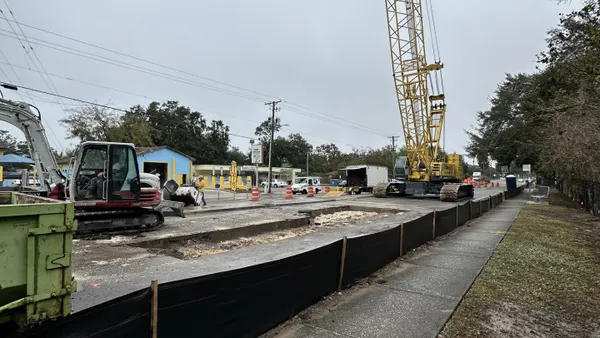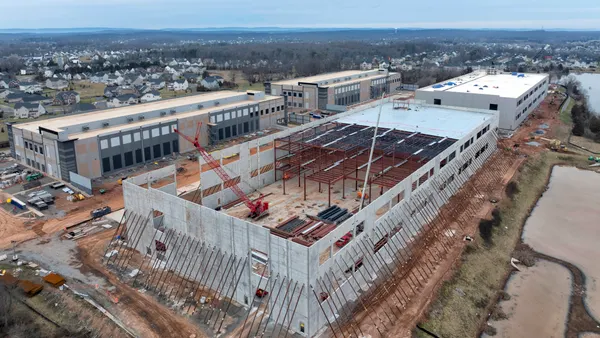The morning after the $1.2 trillion bipartisan infrastructure bill passed the House of Representatives earlier this month, dozens of stocks tied to construction experienced a boost, with some funds even passing record highs, according to CNBC.
The package, which President Joe Biden signed into law Nov. 16, pays for power, broadband and water infrastructure, among other things, and promises to boost construction firms public and private from around the country for years to come.
"I think this is going to be a rising tide for most construction firms that are involved in various flavors of infrastructure," said Matt Arnold, senior equity analyst for St. Louis-based financial services firm Edward Jones. "But given the breadth and the sheer size of this bill, it's going to be an environment where it would be hard to picture your average construction company not finding some opportunity coming their way."
But some engineering and construction companies will benefit more than others. Construction Dive spoke with several stock market analysts to determine which public companies stand to gain the most from the spending measure. Here is a rundown of the biggest winners as well as the challenges on the horizon:
AECOM. Nearly every analyst mentioned Dallas-based AECOM as a clear winner when it comes to infrastructure projects, and optimism about the spending package is already permeating throughout the large public contractor. During its recent fourth-quarter earnings conference, CEO Troy Rudd said the legislation would provide much-needed, long-term funding certainty across the company's strongest markets, such as transit modernization, electrification, environmental remediation and climate resilience.
"Importantly, we are positioned to benefit from nearly every line item in this bill," Rudd said. "We anticipate this funding will increase our addressable market and our most profitable business by double digits over the coming years, and we expect the most meaningful benefits in fiscal 2023 and beyond."
AECOM gains 35% of its revenues from transportation and 28% from environment and water end markets, according to Krzysztof Smalec, an equity analyst on the industrials team for Chicago-based financial services firm Morningstar. "If you look at a company like AECOM, almost two-thirds of their revenue is very well aligned with the [infrastructure] spending," he said
Jacobs. Other industry analysts also placed AECOM in the winner's category, but the construction behemoth wasn't alone. Dallas-based technical, professional and construction services firm Jacobs Engineering Group also stands to benefit.
"If you look at the overall bill, I would say that the two companies that are the best positioned are AECOM and Jacobs," Arnold said. "They both have a very strong competitive position, particularly in the transportation, water and environmental markets."
Smalec agrees. He said 17% of Jacobs' revenue comes from transportation work, 12% are in water projects and 6% are in the environmental space. "Those are some areas where I think they can really see some upside," he said.
Fluor. While Smalec also thinks Irving, Texas-based engineering and construction company Fluor should benefit because of its strong position in transportation, including the highways and bridges space, its upside will be limited.
"Fluor will see less growth just because I don't think they are as broadly exposed to the priorities in the infrastructure bill," Smalec said. "They're a little bit more focused on legacy oil and gas type work."
In the past, Fluor has had issues with cost overruns on fixed-priced projects — something many public firms have dealt with in recent years — which could make the company less aggressive, according to Smalec.
"I think they're going to try to be more conservative,” he said. “They've indicated before that they're going to focus on states where they have a proven track record. So I think a company like Fluor will likely be more selective with pursuing opportunities to make sure that they're not just chasing revenue, but that they're also keeping in mind margins."
The tracker below shows how the stock prices of major U.S.-based contractors have fared since the bill was signed into law. Click the company names at the top to scroll through:
Sterling/Tetra Tech. Outside of the overall boost that massive national companies like AECOM and Jacobs will enjoy, other companies will benefit from certain pockets of spending. Sean Eastman, equity research analyst at Cleveland-based corporate and investment bank KeyBanc Capital Markets, expects the 30% increase in baseline transportation funding to boost Houston-based heavy civil construction company Sterling Construction Co. and the $55 billion investment in water infrastructure to help Pasadena, California-based consulting and engineering services firm Tetra Tech.
Other beneficiaries. With $65 billion in funding slated for rural broadband and electric grid modernization, Eastman said companies in that sector as also poised to benefit. They include:
- Palm Beach Gardens, Florida-based telecommunications and infrastructure contractor Dycom Industries.
- Coral Gables, Florida-based infrastructure engineering and construction firm MasTec.
- Henderson, Colorado-based holding company of specialty electrical construction service providers MYR Group.
- Houston-based infrastructure services provider Quanta Services.
- Dallas-based specialty construction and infrastructure firm Primoris Services Corp.
"That [electric grid funding] is an end market that's already got a lot of momentum behind it and this just seems materially additive," Eastman said.











